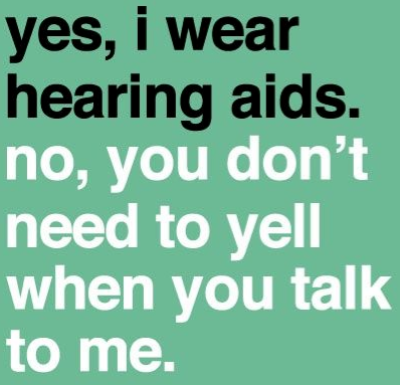Blog
-

Learning To Live With A Hearing Loss
 30 Oct , 2017
30 Oct , 2017
Learning To Live With A Hearing Loss
Acquired hearing loss is on the rise, for many reasons. Among them, the population is aging and our environment is very noisy. And the Veterans Administration says hearing loss and deafness is the number one problem for returning veterans.
Hearing loss for a spouse is particularly problematic. I know because I became completely deaf at 33. It is also a problem for the hearing spouse. Both of you have spent years communicating and now — bam! — everything is different.
Probably one of the first things you do is get a hearing aid. There are some advertised in magazines that are very inexpensive. They also don’t work well because they simply amplify sound. It does not help the dead cells in your inner ear.
If you have this problem, do yourself a huge favor and go to a registered audiologist. You will be tested to find which cells are dead and to amplify the living cells to your need. For example, you may have lost hearing in the upper tones, which is common. Consonants are in this range which is why you have a hard time hearing speech.
Even if you get a hearing aid, the tendency is to think all your problems are solved. They are just beginning.
There are coping strategies, but you both have to commit to learn them. Each of you has to adjust, but it is harder to do when one, or both of you, is tired or stressed. The first is to sit and tell each other how the hearing loss affects you. For example, “My hearing loss affects my sense of control by….” The hearing spouse says, “Your hearing loss affects my sense of control by….” Really listen to each other without feeling threatened.
When you are talking, realize you have a lifetime of habits to overcome. For my husband it was to stop saying, “In here!” when I called to ask where he was in the house. He also had to learn he can’t talk to me from another room or with his back turned. He also has had to learn I can’t hear him and the TV at the same time, even though I also use the captions.
My son has a bad hearing loss and his wife has had to pave the way for communication with others. She had to train their children to talk to their dad directly and not go through her. After church, when people were chitchatting, someone would say to her, “Tell him … ” She would say “Tell him yourself.”
Ask the person trying to talk to you to please face you. (You are unwittingly learning to read lips.) Tell them what you need in order to hear them. There may be times the person will say, “Forget it. It’s not important.” That comes with the territory, so don’t feel bad that the person can’t be courteous.
When you are in church or where there is a speaker, try to get as close to the front as possible. Because there are three couples in our church who have a hearing problem, our pastor uses a portable pulpit on the floor so we can read his lips and hear better. Whenever there is a group meeting, we sit in a circle.
As your hearing loss progresses, you’ll probably find you don’t enjoy going to a movie that is mostly dialogue. I still enjoy musical venues even though I can’t hear the words. If your spouse wants to see a program that is hard for you to hear, be a good sport and go anyway. But the spouse has to return the favor.
If you are in a group setting, it is nice for the hearing person to tell the deafened one the gist of the conversation. It makes me feel part of the group.
One area where my husband is a huge help is the telephone. We have VOIP with two handsets.
He gets on one when I’m on the other. That way if I don’t hear something, he is able to tell me what was said.
There are worse things than becoming hard of hearing or deaf. Through the years I have had to depend on others much more than I ever thought I would when I was a stubborn, determined hearing person. It was only after I became deaf that I realized I truly could do nothing without others help.
Source: Gayle Raif, News-journal.com
Image credit: yes-butno





























































































































































































































































































































































































































































































































































































